Humans are fishing and hunting animals that are the wrong size and age, in an unsustainable way that flies in the face of nature, a new study finds.
Long-held conservation policies and traditions that tell fishermen to throw back small fry and encourage hunters to bag only the biggest trophies often hurt species instead of helping them, according to the authors of a study released Thursday by the journal Science.
The study compared humans to other predators to see what they killed, looking at nearly 400 species in the oceans and on every continent except Antarctica. And while other animals tend to kill the young, small and weak, humans kill the more mature animals that are in their reproductive primes. It found humans killed up to 14 times more adults than other animal predators, with the biggest differences in prey seen in how humans fish.
Thanks to our tools and intelligence, humans now boast “rather unnatural, unusual predator behavior,” said study lead author Chris Darimont, a conservation scientist at the University of Victoria in Canada. The method is “not considering the hand of Darwin.”
‘Super predators’
The ways humans hunt and fish “change the rules of the game” of evolution from survival of the fittest to survival of the smallest, Darimont said. Humans, he said, are “super predators.”
Taking bigger fish or wildlife has “remarkable short-term benefits” - for example, it makes it easier to process for food. But long term, it's a loser,” Darimont said.
The collapse of the Atlantic cod is a good example, Darimont said. If female cod live long enough, they are “cod-making machines.” He said a fish that can grow an extra 10 percent often produces more than double the amount of eggs.
As fishermen spare smaller cod and target bigger ones, scientists have noticed that Atlantic cod population has changed to breed earlier in their lifetime, he said.
In a statement, Richard Methot, the science adviser for fish stock assessments at the U.S. National Oceanic and Atmospheric Administration, said the agency uses quotas to manage overfishing that “closely examines the balance of fishery impacts on young versus old fish and designs harvest rates that allow fish and shellfish to grow to sizes that produce seafood for the nation while preserving stock and ecosystem sustainability.”
Renowned conservation expert Stuart Pimm of Duke University, who wasn't part of the study, praised it.
“We ought to be harvesting animals that are about to die from other causes,” he said.
Bill Fox, vice president of fisheries at the World Wildlife Fund, questioned the study's conclusion that more juveniles and fewer adults should be taken by fishermen. He said the best option may be more of a mix of both.
Darimont himself hunts deer and fishes for salmon, but in both cases he prefers young prey because they taste better. But he added that men have evolved to like bigger trophies in hunting and fishing to impress others.
No one mounts a small fish above a fireplace, he acknowledged.




